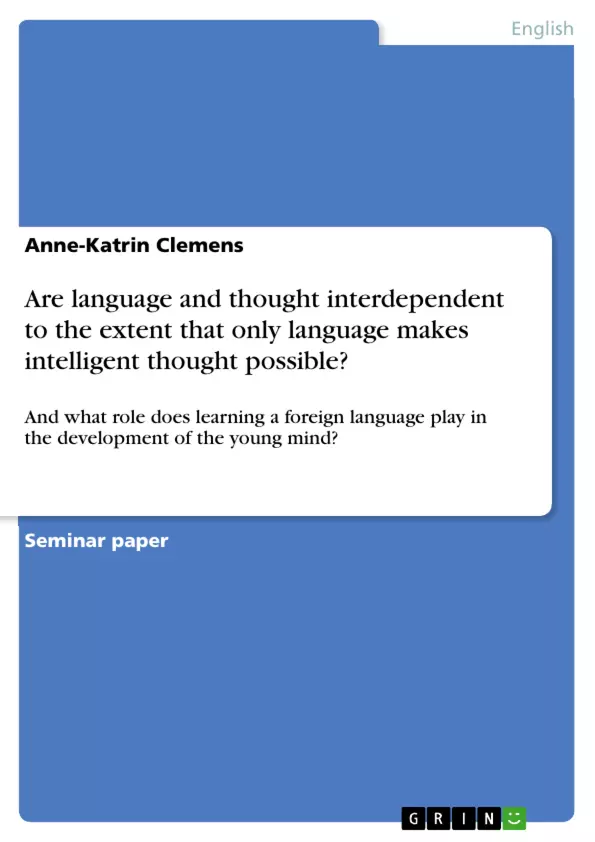Learning a foreign language does not seem to affect semantic representations in the first language. But does it change cognition in any way? We do know that the brain accommodates a foreign language purely anatomically up to the age of twelve and we know that this heightened flexibility in our neurological pathways allows for more flexible combining of core-knowledge systems, thus giving an advantage in other cognitive areas. What we do not know is if it actually changes our perception of the world.
Inhaltsverzeichnis (Table of Contents)
- Are language and thought interdependent to the extent that only language makes intelligent thought possible? And what role does learning a foreign language play in the development of the young mind?
- Introduction
- Theoretical Background
- The Sapir-Whorf Hypothesis
- Theories of Language Acquisition
- Empirical Research
- The BiLieF Project
- Studies on Bilingualism and Cognitive Development
- Discussion
Zielsetzung und Themenschwerpunkte (Objectives and Key Themes)
This paper explores the relationship between language and thought, specifically investigating whether language is essential for intelligent thought. It also examines the impact of foreign language learning on cognitive development in children.
- The Sapir-Whorf Hypothesis and its implications for the relationship between language and thought
- Theories of language acquisition and their relevance to cognitive development
- Empirical research findings on the cognitive benefits of bilingualism
- The role of foreign language learning in shaping the developing mind
- The potential of language learning to enhance cognitive abilities and promote intellectual growth
Zusammenfassung der Kapitel (Chapter Summaries)
- The introduction sets the stage for the paper by introducing the central question: does language play a crucial role in intelligent thought? It also highlights the significance of foreign language learning in child development.
- The theoretical background section delves into the Sapir-Whorf Hypothesis, a prominent theory that proposes a strong link between language and thought. It then examines various theories of language acquisition, focusing on their relevance to cognitive development.
- The empirical research section presents an overview of relevant research, including the BiLieF project and studies on bilingualism and cognitive development. These studies shed light on the potential cognitive benefits of bilingualism and the impact of foreign language learning on the brain.
Schlüsselwörter (Keywords)
The main keywords and focus topics of this paper include language and thought interdependence, the Sapir-Whorf Hypothesis, theories of language acquisition, bilingualism, cognitive development, foreign language learning, and empirical research findings.
Frequently Asked Questions
Does language determine how we think?
The paper explores the Sapir-Whorf Hypothesis, which suggests a strong interdependence between language and thought, influencing our perception of the world.
Does learning a foreign language change cognition?
Research indicates that foreign language learning can heighten neurological flexibility and improve cognitive core-knowledge systems.
Up to what age is the brain most flexible for language acquisition?
The brain accommodates foreign languages purely anatomically up to the age of twelve, allowing for more flexible neurological pathways.
What are the cognitive benefits of bilingualism?
Bilingualism is linked to advantages in various cognitive areas, including enhanced problem-solving and better multitasking abilities.
What is the BiLieF project?
It is an empirical research project discussed in the paper that investigates bilingualism and its impact on cognitive development.
- Arbeit zitieren
- Anne-Katrin Clemens (Autor:in), 2010, Are language and thought interdependent to the extent that only language makes intelligent thought possible?, München, GRIN Verlag, https://www.grin.com/document/201223



